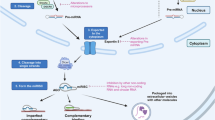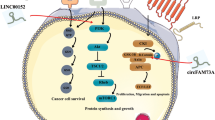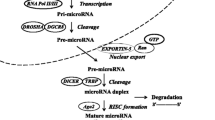Abstract
Purpose
Gastric cancer is one of the most common malignant diseases worldwide, although much progress has been achieved in recent years, the early diagnosis and treatment for gastric cancer are not yet satisfactory and, thus the prognosis is still poor. MicroRNAs (miRNAs) can regulate a variety of physiological and developmental processes, it has been revealed that many miRNAs contribute the initiation and progression of various cancers. MiR-148a is one of the most important miRNAs in gastric cancer, and the aim of this paper is to provide an overview of various roles of miR-148a in gastric cancer.
Methods and results
We searched studies in electronic databases. MiR-148a was down-regulated in gastric cancer tissues and cell lines, which was resulted from the hypermethylation in its promoter region. Furthermore, miR-148a could regulate several different target genes and pathways involving tumor proliferation, invasion and metastasis.
Conclusion
MiR-148a may serve as a novel biomarker for the diagnosis and as a new therapeutic target in gastric cancer.

Similar content being viewed by others
References
Agarwal S, Amin KS, Jagadeesh S, Baishay G, Rao PG, Barua NC, Bhattacharya S, Banerjee PP (2013) Mahanine restores RASSF1A expression by down-regulating DNMT1 and DNMT3B in prostate cancer cells. Mol Cancer 12(1):99. doi:10.1186/1476-4598-12-99
Alexiou P, Maragkakis M, Papadopoulos GL, Reczko M, Hatzigeorgiou AG (2009) Lost in translation: an assessment and perspective for computational microRNA target identification. Bioinformatics 25(23):3049–3055. doi:10.1093/bioinformatics/btp565
Anders G, Mackowiak SD, Jens M, Maaskola J, Kuntzagk A, Rajewsky N, Landthaler M, Dieterich C (2012) doRiNA: a database of RNA interactions in post-transcriptional regulation. Nucleic Acids Res 40 (Database issue):D180–D186. doi:10.1093/nar/gkr1007
Braconi C, Huang N, Patel T (2010) MicroRNA-dependent regulation of DNA methyltransferase-1 and tumor suppressor gene expression by interleukin-6 in human malignant cholangiocytes. Hepatology 51(3):881–890. doi:10.1002/hep.23381
Cacan E, Ali MW, Boyd NH, Hooks SB, Greer SF (2014) Inhibition of HDAC1 and DNMT1 modulate RGS10 expression and decrease ovarian cancer chemoresistance. PLoS ONE 9(1):e87455. doi:10.1371/journal.pone.0087455
Chen Y, Song Y, Wang Z, Yue Z, Xu H, Xing C, Liu Z (2010) Altered expression of MiR-148a and MiR-152 in gastrointestinal cancers and its clinical significance. J Gastrointest Surg 14(7):1170–1179. doi:10.1007/s11605-010-1202-2
Chen Z, Saad R, Jia P, Peng D, Zhu S, Washington MK, Zhao Z, Xu Z, El-Rifai W (2013) Gastric adenocarcinoma has a unique microRNA signature not present in esophageal adenocarcinoma. Cancer 119(11):1985–1993. doi:10.1002/cncr.28002
Croce CM (2009) Causes and consequences of microRNA dysregulation in cancer. Nat Rev Genet 10(10):704–714. doi:10.1038/nrg2634
Ferlay J, Shin HR, Bray F, Forman D, Mathers C, Parkin DM (2010) Estimates of worldwide burden of cancer in 2008: GLOBOCAN 2008. Int J Cancer 127(12):2893–2917. doi:10.1002/ijc.25516
Guo SL, Peng Z, Yang X, Fan KJ, Ye H, Li ZH, Wang Y, Xu XL, Li J, Wang YL, Teng Y, Yang X (2011) miR-148a promoted cell proliferation by targeting p27 in gastric cancer cells. Int J Biol Sci 7(5):567–574
Herman JG, Baylin SB (2003) Gene silencing in cancer in association with promoter hypermethylation. N Engl J Med 349(21):2042–2054. doi:10.1056/NEJMra023075
Ichikawa D, Komatsu S, Konishi H, Otsuji E (2012) Circulating microRNA in digestive tract cancers. Gastroenterology 142(5):1074–1078. doi:10.1053/j.gastro.2012.03.008
Iorio MV, Croce CM (2012) microRNA involvement in human cancer. Carcinogenesis 33(6):1126–1133. doi:10.1093/carcin/bgs140
Ito K (2011) RUNX3 in oncogenic and anti-oncogenic signaling in gastrointestinal cancers. J Cell Biochem 112(5):1243–1249. doi:10.1002/jcb.23047
Khorshid M, Rodak C, Zavolan M (2011) CLIPZ: a database and analysis environment for experimentally determined binding sites of RNA-binding proteins. Nucleic Acids Res 39 (Database issue):D245–D252. doi:10.1093/nar/gkq940
Kim SY, Jeon TY, Choi CI, Kim DH, Kim DH, Kim GH, Ryu DY, Lee BE, Kim HH (2013) Validation of circulating miRNA biomarkers for predicting lymph node metastasis in gastric cancer. J Mol Diagn 15(5):661–669. doi:10.1016/j.jmoldx.2013.04.004
Lee Y, Kim M, Han J, Yeom KH, Lee S, Baek SH, Kim VN (2004) MicroRNA genes are transcribed by RNA polymerase II. EMBO J 23(20):4051–4060. doi:10.1038/sj.emboj.7600385
Liu R, Zhang C, Hu Z, Li G, Wang C, Yang C, Huang D, Chen X, Zhang H, Zhuang R, Deng T, Liu H, Yin J, Wang S, Zen K, Ba Y, Zhang CY (2011) A five-microRNA signature identified from genome-wide serum microRNA expression profiling serves as a fingerprint for gastric cancer diagnosis. Eur J Cancer 47(5):784–791. doi:10.1016/j.ejca.2010.10.025
Liu H, Zhu L, Liu B, Yang L, Meng X, Zhang W, Ma Y, Xiao H (2012) Genome-wide microRNA profiles identify miR-378 as a serum biomarker for early detection of gastric cancer. Cancer Lett 316(2):196–203. doi:10.1016/j.canlet.2011.10.034
Mitchell PS, Parkin RK, Kroh EM, Fritz BR, Wyman SK, Pogosova-Agadjanyan EL, Peterson A, Noteboom J, O’Briant KC, Allen A, Lin DW, Urban N, Drescher CW, Knudsen BS, Stirewalt DL, Gentleman R, Vessella RL, Nelson PS, Martin DB, Tewari M (2008) Circulating microRNAs as stable blood-based markers for cancer detection. Proc Natl Acad Sci U S A 105(30):10513–10518. doi:10.1073/pnas.0804549105
Pan W, Zhu S, Yuan M, Cui H, Wang L, Luo X, Li J, Zhou H, Tang Y, Shen N (2010) MicroRNA-21 and microRNA-148a contribute to DNA hypomethylation in lupus CD4 + T cells by directly and indirectly targeting DNA methyltransferase 1. J Immunol 184(12):6773–6781. doi:10.4049/jimmunol.0904060
Rukov JL, Wilentzik R, Jaffe I, Vinther J, Shomron N (2013) Pharmaco-miR: linking microRNAs and drug effects. Brief Bioinform. doi:10.1093/bib/bbs082
Sakamoto N, Naito Y, Oue N, Sentani K, Uraoka N, Zarni Oo H, Yanagihara K, Aoyagi K, Sasaki H, Yasui W (2014) MicroRNA-148a is downregulated in gastric cancer, targets MMP7, and indicates tumor invasiveness and poor prognosis. Cancer Sci 105(2):236–243. doi:10.1111/cas.12330
Schwarzenbach H, Hoon DS, Pantel K (2011) Cell-free nucleic acids as biomarkers in cancer patients. Nat Rev Cancer 11(6):426–437. doi:10.1038/nrc3066
Shi Y, Zhou Y (2010) The role of surgery in the treatment of gastric cancer. J Surg Oncol 101(8):687–692. doi:10.1002/jso.21455
Song S, Ajani JA (2013) The role of microRNAs in cancers of the upper gastrointestinal tract. Nat Rev Gastroenterol Hepatol 10(2):109–118. doi:10.1038/nrgastro.2012.210
Sun M, Xia R, Jin F, Xu T, Liu Z, De W, Liu X (2014) Downregulated long noncoding RNA MEG3 is associated with poor prognosis and promotes cell proliferation in gastric cancer. Tumour Biol 35(2):1065–1073. doi:10.1007/s13277-013-1142-z
Tchernitsa O, Kasajima A, Schafer R, Kuban RJ, Ungethum U, Gyorffy B, Neumann U, Simon E, Weichert W, Ebert MP, Rocken C (2010) Systematic evaluation of the miRNA-ome and its downstream effects on mRNA expression identifies gastric cancer progression. J Pathol 222(3):310–319. doi:10.1002/path.2759
Tennis MA, Vanscoyk MM, Wilson LA, Kelley N, Winn RA (2012) Methylation of Wnt7a is modulated by DNMT1 and cigarette smoke condensate in non-small cell lung cancer. PLoS ONE 7(3):e32921. doi:10.1371/journal.pone.0032921
Tseng CW, Lin CC, Chen CN, Huang HC, Juan HF (2011) Integrative network analysis reveals active microRNAs and their functions in gastric cancer. BMC Syst Biol 5:99. doi:10.1186/1752-0509-5-99
Tsujiura M, Ichikawa D, Komatsu S, Shiozaki A, Takeshita H, Kosuga T, Konishi H, Morimura R, Deguchi K, Fujiwara H, Okamoto K, Otsuji E (2010) Circulating microRNAs in plasma of patients with gastric cancers. Br J Cancer 102(7):1174–1179. doi:10.1038/sj.bjc.6605608
Wang SH, Li X, Zhou LS, Cao ZW, Shi C, Zhou CZ, Wen YG, Shen Y, Li JK (2013) microRNA-148a suppresses human gastric cancer cell metastasis by reversing epithelial-to-mesenchymal transition. Tumour Biol 34(6):3705–3712. doi:10.1007/s13277-013-0954-1
Xu Q, Jiang Y, Yin Y, Li Q, He J, Jing Y, Qi YT, Xu Q, Li W, Lu B, Peiper SS, Jiang BH, Liu LZ (2013) A regulatory circuit of miR-148a/152 and DNMT1 in modulating cell transformation and tumor angiogenesis through IGF-IR and IRS1. J Mol Cell Biol 5(1):3–13. doi:10.1093/jmcb/mjs049
Yan J, Guo X, Xia J, Shan T, Gu C, Liang Z, Zhao W, Jin S (2014) MiR-148a regulates MEG3 in gastric cancer by targeting DNA methyltransferase 1. Med Oncol 31(3):879. doi:10.1007/s12032-014-0879-6
Yang J, Wei X, Wu Q, Xu Z, Gu D, Jin Y, Shen Y, Huang H, Fan H, Chen J (2011a) Clinical significance of the expression of DNA methyltransferase proteins in gastric cancer. Mol Med Rep 4(6):1139–1143. doi:10.3892/mmr.2011.578
Yang JH, Li JH, Shao P, Zhou H, Chen YQ, Qu LH (2011b) starBase: a database for exploring microRNA–mRNA interaction maps from Argonaute CLIP-Seq and Degradome-Seq data. Nucleic Acids Res 39 (Database issue):D202–D209. doi:10.1093/nar/gkq1056
Yasui W, Sentani K, Sakamoto N, Anami K, Naito Y, Oue N (2011) Molecular pathology of gastric cancer: research and practice. Pathol Res Pract 207(10):608–612. doi:10.1016/j.prp.2011.09.006
Yi R, Qin Y, Macara IG, Cullen BR (2003) Exportin-5 mediates the nuclear export of pre-microRNAs and short hairpin RNAs. Genes Dev 17(24):3011–3016. doi:10.1101/gad.1158803
Zheng B, Liang L, Wang C, Huang S, Cao X, Zha R, Liu L, Jia D, Tian Q, Wu J, Ye Y, Wang Q, Long Z, Zhou Y, Du C, He X, Shi Y (2011) MicroRNA-148a suppresses tumor cell invasion and metastasis by downregulating ROCK1 in gastric cancer. Clin Cancer Res 17(24):7574–7583. doi:10.1158/1078-0432.ccr-11-1714
Zheng G, Xiong Y, Xu W, Wang Y, Chen F, Wang Z, Yan Z (2014) A two-microRNA signature as a potential biomarker for early gastric cancer. Oncol Lett 7(3):679–684. doi:10.3892/ol.2014.1797
Zhu A, Xia J, Zuo J, Jin S, Zhou H, Yao L, Huang H, Han Z (2012) MicroRNA-148a is silenced by hypermethylation and interacts with DNA methyltransferase 1 in gastric cancer. Med Oncol 29(4):2701–2709. doi:10.1007/s12032-011-0134-3
Zuo J, Xia J, Ju F, Yan J, Zhu A, Jin S, Shan T, Zhou H (2013) MicroRNA-148a can regulate runt-related transcription factor 3 gene expression via modulation of DNA methyltransferase 1 in gastric cancer. Mol Cells 35(4):313–319. doi:10.1007/s10059-013-2314-9
Acknowledgments
This work was supported by Six Major Talent Summit of Jiangsu Province (2011-WSK-013).
Conflict of interest
The authors have no conflict of interest to declare.
Author information
Authors and Affiliations
Corresponding author
Rights and permissions
About this article
Cite this article
Xia, J., Guo, X., Yan, J. et al. The role of miR-148a in gastric cancer. J Cancer Res Clin Oncol 140, 1451–1456 (2014). https://doi.org/10.1007/s00432-014-1649-8
Received:
Accepted:
Published:
Issue Date:
DOI: https://doi.org/10.1007/s00432-014-1649-8




